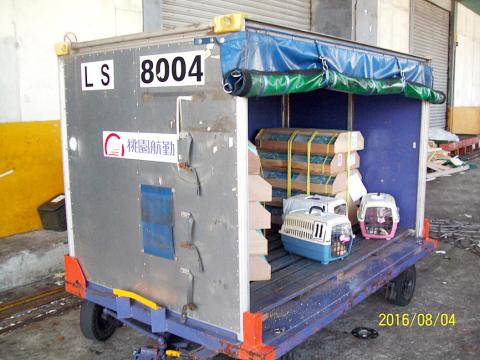Taoyuan International Airport Services Co (桃園航勤) yesterday apologized for killing more than 1,000 animals because it failed to follow standard operating procedures by leaving the animals in airtight containers in hot weather.
The incident involving three dogs, two cats and 10 boxes of birds was “isolated,” the company said, adding that the personnel who mishandled the animals would be punished.
As of noon yesterday, two dogs remained in critical condition, while all the other animals were pronounced dead of heat exhaustion, the Taoyuan Office of Animal Care and Control said.

Photo: Screengrab by Hsieh Wu-hsiung, Taipei Times
The company, which provides ground service to airlines using Taiwan Taoyuan International Airport, has confirmed 1,000 baby lovebirds died as a result of the incident.
The animals were destined for Kuala Lumpur on a China Airlines (CAL, 中華航空) flight, but ground service personnel checked out the animals too early before the plane’s takeoff and left them in a container without ventilation on a parking apron, the office said.
Office secretary Kuan Te-ming said authorities were checking surveillance camera footage to identify the personnel responsible for the incident.
It is also examining evidence to see whether the airline or the airport should also be held responsible, he said.
The animals could have been trapped in an environment of about 60°C, according to the office.
Standard operating procedures specify that live animals should not be transferred to containers more than 30 minutes before takeoff.
When they are transported to the aircraft, standard operating procedures require the use of a dedicated container with a grill on one side to ensure ventilation.
Kuan said the incident, the first in Taiwan’s aviation history, could lead to a fine of between NT$15,000 and NT$75,000 for the personnel who handled the animals.
If the incident is found to have been intentional, the violator could face a one-year prison sentence, it said.

INVESTIGATION: The case is the latest instance of a DPP figure being implicated in an espionage network accused of allegedly leaking information to Chinese intelligence Democratic Progressive Party (DPP) member Ho Jen-chieh (何仁傑) was detained and held incommunicado yesterday on suspicion of spying for China during his tenure as assistant to then-minister of foreign affairs Joseph Wu (吳釗燮). The Taipei District Prosecutors’ Office said Ho was implicated during its investigation into alleged spying activities by former Presidential Office consultant Wu Shang-yu (吳尚雨). Prosecutors said there is reason to believe Ho breached the National Security Act (國家安全法) by leaking classified Ministry of Foreign Affairs information to Chinese intelligence. Following interrogation, prosecutors petitioned the Taipei District Court to detain Ho, citing concerns over potential collusion or tampering of evidence. The

‘FORM OF PROTEST’: The German Institute Taipei said it was ‘shocked’ to see Nazi symbolism used in connection with political aims as it condemned the incident Sung Chien-liang (宋建樑), who led efforts to recall Democratic Progressive Party (DPP) Legislator Lee Kun-cheng (李坤城), was released on bail of NT$80,000 yesterday amid an outcry over a Nazi armband he wore to questioning the night before. Sung arrived at the New Taipei City District Prosecutors’ Office for questioning in a recall petition forgery case on Tuesday night wearing a red armband bearing a swastika, carrying a copy of Adolf Hitler’s Mein Kampf and giving a Nazi salute. Sung left the building at 1:15am without the armband and apparently covering the book with a coat. This is a serious international scandal and Chinese

Seventy percent of middle and elementary schools now conduct English classes entirely in English, the Ministry of Education said, as it encourages schools nationwide to adopt this practice Minister of Education (MOE) Cheng Ying-yao (鄭英耀) is scheduled to present a report on the government’s bilingual education policy to the Legislative Yuan’s Education and Culture Committee today. The report would outline strategies aimed at expanding access to education, reducing regional disparities and improving talent cultivation. Implementation of bilingual education policies has varied across local governments, occasionally drawing public criticism. For example, some schools have required teachers of non-English subjects to pass English proficiency

TRADE: The premier pledged safeguards on ‘Made in Taiwan’ labeling, anti-dumping measures and stricter export controls to strengthen its position in trade talks Products labeled “made in Taiwan” must be genuinely made in Taiwan, Premier Cho Jung-tai (卓榮泰) said yesterday, vowing to enforce strict safeguards against “origin laundering” and initiate anti-dumping investigations to prevent China dumping its products in Taiwan. Cho made the remarks in a discussion session with representatives from industries in Kaohsiung. In response to the US government’s recent announcement of “reciprocal” tariffs on its trading partners, President William Lai (賴清德) and Cho last week began a series of consultations with industry leaders nationwide to gather feedback and address concerns. Taiwanese and US officials held a videoconference on Friday evening to discuss the